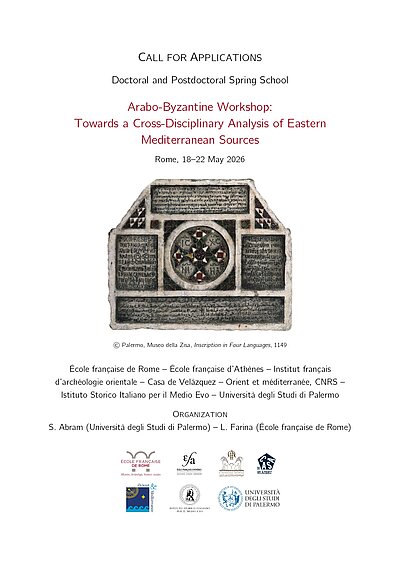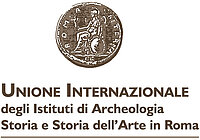Doctoral and Postdoctoral Spring School
Arabo-Byzantine Workshop : Towards a Cross-Disciplinary Analysis of Eastern Mediterranean Sources
Rome, 18–22 May 2026
Organization
S. Abram (Università degli Studi di Palermo) ; L. Farina (École française de Rome)
Partners
École française de Rome ; École française d’Athènes ; Institut français d’archéologie orientale ; Casa de Velázquez ; Orient et méditerranée, CNRS ; Istituto Storico Italiano per il Medio Evo ; Università degli Studi di Palermo
→ Download the call for applications
| Workshop Rationale |
A fresh understanding of medieval Eastern Mediterranean history requires a careful and integrated reading of a wide range of primary sources. Textual, documentary, and material sources (such as manuscripts, papyri, coins, and seals) all offer distinct perspectives, yet they are often studied in disciplinary and linguistic isolation. An effective historical analysis demands not only philological precision, but also a solid methodological approach that includes close attention to the materiality of these objects: their format, script, language, and context of production. Such features can reveal much about circulation of objects and knowledge, as well as its transmission and usage. This is especially vital when working with sources in Arabic and Greek, the two dominant languages of administration, culture, and daily life across much of the medieval Eastern Mediterranean. Moreover, bilingual or multilayered sources (such as Graeco-Arabic manuscripts and papyri, or Arabo-Byzantine coinage) provide invaluable insight into contact zones and hybrid identities. A critical and comparative reading across both source typologies and linguistic traditions thus allows historians to reconstruct cultural and event-driven history in a more comprehensive and dynamic way, uncovering layers of meaning that would remain hidden in a monolingual or single-source approach.
The aim of this workshop is to equip participants with both a nuanced understanding of the different typologies of medieval sources and the methodological tools necessary to address their diversity and fluidity in a rigorous way. In addition, the workshop seeks to foster dialogue between experts and early-career researchers from a range of disciplines (including Classical, Byzantine, and Islamic Studies) who have often worked in isolation within the boundaries of their respective fields.
The workshop will be organized over five thematic days, each dedicated to a specific category of sources for the study of medieval Eastern mediterranean history (paleography/codicology, diplomatics, sigillography/numismatics, papyrology, and philology) and their critical and comparative analysis. Each afternoon, two participants will present their own work (30-minute presentations followed by 15 minutes of discussion). Each day will conclude with either a case study or a practical session designed to build on and integrate the material covered in the morning sessions.
Practical Information |
- Eligible Participants: Doctoral and early-career researchers in Classics, Islamic Studies, or History (broadly intended) from any university and of any nationality. Training in Greek or Arabic paleography or philology is not required, but it is welcome. A working knowledge of both Greek and Arabic is required.
- Venues: Rome — École française de Rome [Piazza Navona 62]; Istituto Storico Italiano per il Medio Evo [Piazza dell’Orologio 4].
- Costs: Registration, lunches, and accommodation are free of charge. Participants are responsible for their own travel and dinner expenses.
- Language: English.
- Application Deadline: 19 December 2025, 12:00 noon (CET).
Requirements |
Applications must include the following documents (in English):
- A Curriculum Vitae;
- A one-page summary of the doctoral dissertation or postdoctoral project;
- A one-page motivation letter outlining the candidate’s future projects and explaining their interest in the workshop.
Applications must be submitted as a single PDF file by 19 December 2025 at 12:00 noon (CET) to the following addresses: luca.farina(at)efrome.it and sara.abram(at)unipa.it.
The selection will be made by a joint committee from the École française de Rome, the Università degli Studi di Palermo, and the Istituto Storico Italiano per il Medio Evo. The results will be communicated no later than 30 January 2026.
Admitted participants will be accommodated at the École française de Rome (in shared or individual rooms) located in Piazza Navona, and lunches will be provided. Travel to/from Rome and dinners will be at the expense of the participants or their home institutions.
For any practical or logistical inquiries, please contact: luca.farina(at)efrome.it or secrma(at)efrome.it.




